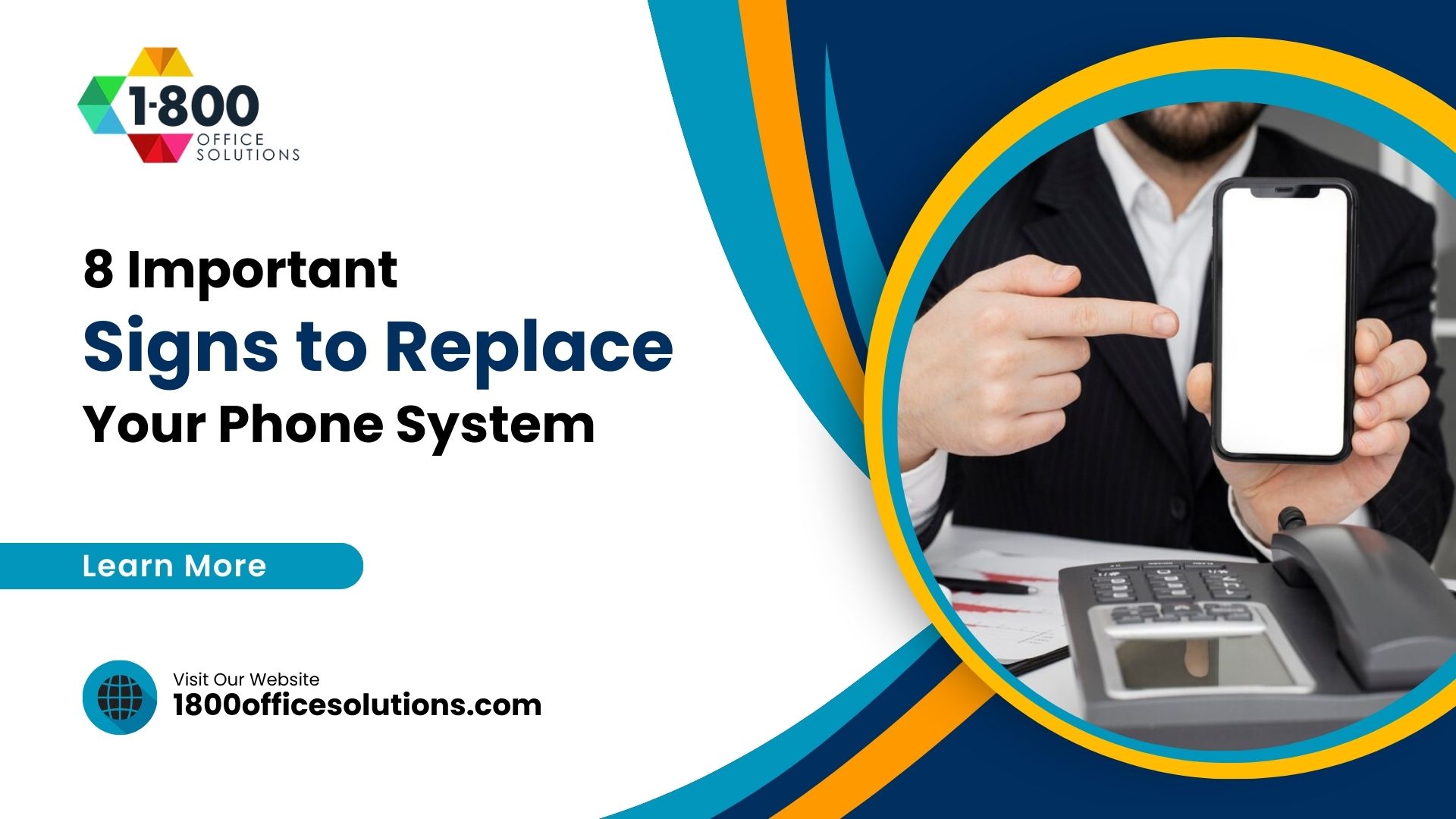Is Your Office Phone System Falling Behind? Find Out Now for Small Business
Office Phone System for Small Business
In today’s dynamic and competitive business landscape, the significance of a steadfast office phone system is paramount. For many, especially small business owners, it acts as the central nerve of communication, bridging the gap between businesses and their valued clients, strategic partners, and dedicated employees. Whether it’s a traditional landline phone, a modern VoIP phone system, or a versatile cloud-based phone system, the right choice can elevate business communication to new heights.
However, the vast array of phone systems on offer, from analog phone setups to advanced IP phone systems, can sometimes be overwhelming. It’s not just about having a business phone number; it’s about how effectively a business phone service can handle myriad business calls, ensuring no client is left waiting on a phone line. The evolution from traditional phone systems to voice over internet protocol (VoIP) and even zoom phone integrations signifies the rapid advancements in this domain.
Yet, the challenge remains for small business owners to choose the best small business phone system tailored to their unique business needs. Whether it’s the simplicity of a desk phone, the mobility of a mobile phone, or the advanced features of a cloud phone system, the decision can significantly impact operational efficiency. An outdated or inefficient system can lead to missed opportunities and disgruntled customers.
In contrast, the best business phone system can ensure seamless operations, instill trust, and enhance customer satisfaction. If you have a phone plan , there are multiple type of business phone system in the market and business phone provider. The bottom line is clear: the quality and efficiency of the chosen phone service can make or break a business in this digital age.
Common Problems with Small Business Phone Systems
Business Phone Systems Can Be Too Complex
Challenges of complex systems:
- Many business phone systems are laden with features that, while impressive, can be overwhelming for the average user. This complexity can lead to errors, missed calls, and general inefficiency.
- For small business owners, navigating these intricate systems without proper training can be a daunting task, leading to wasted time and resources.
Importance of user-friendly interfaces:
- A phone system for small businesses should be intuitive. The easier it is to understand, the quicker employees can adapt, ensuring that the business runs smoothly.
- Investing in a phone service with a user-friendly interface can drastically reduce training time and increase overall productivity.
Traffic Jams and Toll-Free Numbers
The downside of toll-free numbers:
- While toll-free numbers can make a business appear more professional, they can also lead to traffic jams. High call volumes can overwhelm systems, leading to dropped calls and frustrated customers.
- Additionally, toll-free numbers can sometimes lack the personal touch that many customers appreciate, especially when dealing with small businesses.
Solutions to manage high call volumes:
- Implementing a cloud-based phone system or VoIP phone system can help manage high call volumes more efficiently. These systems can distribute calls, ensuring that no single line is overwhelmed.
- Businesses can also use features like call queuing or automated responses to manage high traffic, ensuring that every customer is attended to. In the market there are many business phone service provider, so chose a business phone wisely.
System Queue and Customer Options
Importance of a comprehensive call queue:
- A well-organized call queue ensures that every call is attended to in the order it was received. This not only improves efficiency but also ensures that customers feel valued.
- For small business phone systems, a comprehensive call queue can make the difference between a satisfied customer and a lost opportunity.
Ensuring customers have multiple options:
- Modern business phone systems offer various options for customers, from direct lines to specific departments to automated responses.
- Providing multiple options ensures that customers can always find the help they need, improving their overall experience.
Receptionist Phone Features
The role of the receptionist in call management:
- The receptionist often serves as the first point of contact for a business. As such, they need tools that allow them to manage calls efficiently, directing them to the appropriate departments or individuals.
- A desk phone with advanced features can help receptionists manage high call volumes, ensuring that every call is handled professionally.
Features needed for efficient call transfers:
- Call transfer features allow receptionists to direct calls seamlessly. Features like “hold,” “transfer,” and “direct dial” can make the process more efficient.
- Additionally, features like caller ID can provide receptionists with valuable information, allowing them to greet callers by name, adding a personal touch to every interaction.
Top 10 Phone Service Problems and Their Fixes
No Dial Tone
A lack of a dial tone can be a major issue for any business phone number. This problem can arise due to issues with the phone line, landline connections, or even the desk phone itself. Solutions include checking physical connections, ensuring the phone isn’t set to “silent,” and consulting with the phone provider.
No Outside Calls
Being unable to make outside calls can cripple a business’s ability to communicate. This issue can arise due to problems with the VoIP system, restrictions set by the phone service provider, or even issues with the business phone service itself. Resolving this requires checking the system settings, ensuring there’s no block on outgoing calls, and consulting with the service provider.
Static Noise on the Line
Static noise can make communication difficult and can be caused by issues with the phone line, external interference, or even a faulty desk phone. Solutions include checking the phone’s physical connections, ensuring there’s no interference from other electronic devices, and replacing faulty hardware.
Poor Call Quality and Dropped Calls
Poor call quality can be a result of a weak VoIP phone system connection, issues with the phone service provider, or even problems with the business phone service. Solutions include checking the internet connection, ensuring the VoIP system is set up correctly, and consulting with the service provider.
Choppy Sound on Call
Choppy sound can be caused by a slow internet connection, issues with the VoIP business phone system, or even problems with the phone service provider. Resolving this issue requires checking the internet speed, ensuring the VoIP system is functioning correctly, and consulting with the service provider.
Delays in Transmission
Transmission delays, often experienced as an echo, can be caused by a slow VoIP system, issues with the phone service provider, or even problems with the business phone service. Solutions include checking the VoIP system’s settings, ensuring there’s no interference, and consulting with the service provider.
No Ring on Forwarding Phones
If forwarded phones don’t ring, it could be due to settings in the phone system for small businesses, issues with the phone service provider, or even problems with the business phone service. Resolving this requires checking the system’s forwarding settings, ensuring the numbers are entered correctly, and consulting with the service provider.
Calls Not Leaving Voicemail
If calls aren’t leaving voicemails, it could be due to full voicemail boxes, issues with the VoIP business phone system, or even problems with the phone service provider. Solutions include clearing out old voicemails, checking the system’s voicemail settings, and consulting with the service provider.
Silence on Call While Holding the Line
Silence while on hold can be off-putting for callers. This can be caused by issues with the phone system for small businesses, problems with the phone service provider, or even the business phone service itself. Resolving this requires checking the system’s on-hold music or message settings and ensuring they’re set up correctly.
Too Many Spam Calls
Spam calls can be a major distraction. They can be reduced by using features in the phone system for small businesses to block unwanted numbers, registering the business phone number on do-not-call lists, and using advanced features like call screening.
Incorporating these solutions and understanding the intricacies of modern business phone systems can drastically improve communication efficiency, ensuring that businesses can focus on what they do best. Whether you’re a small business owner or a large enterprise, ensuring your communication systems are in top shape is crucial for success.
Other Common Problems With Best Small Business Phone System
Outdated Phone System
In the rapidly evolving world of technology, using an outdated phone system can be detrimental to a business’s efficiency and customer satisfaction.
Challenges of using outdated systems:
- Outdated systems often lack the advanced features that modern businesses require. This can lead to inefficiencies, missed opportunities, and frustrated customers.
- Older systems might not be compatible with newer technologies, leading to integration issues and potential communication breakdowns.
- Maintenance for older systems can be costly, with parts being hard to find and support being limited.
The need for regular upgrades:
- Regularly upgrading the phone system ensures that a business stays competitive and can leverage the latest features and integrations.
- An updated phone system for your business can offer better security, clearer call quality, and integration with other business tools.
Limited Phone Features
As businesses grow and evolve, so do their communication needs.
The evolution of phone features:
- Gone are the days when a phone system simply made and received calls. Modern systems offer features like video conferencing, integration with CRM systems, and advanced analytics.
- The best phone systems for 2023 are expected to be even more integrated, offering AI-driven insights, better automation, and seamless integration with other business tools.
Importance of advanced features for modern businesses:
- Advanced features allow businesses to serve their customers better, streamline operations, and make data-driven decisions.
- Features like automated call routing, virtual phone system, and advanced analytics can drastically improve a business’s efficiency and customer satisfaction.
Overly Advanced Business Phones
While advanced features are beneficial, there’s such a thing as too advanced.
The challenges of overly complex systems:
- Overly complex systems can be intimidating for users, leading to a steep learning curve and potential mistakes.
- Features that aren’t relevant to a business’s operations can clutter the interface, making the system harder to navigate.
- Training employees on overly complex systems can be time-consuming and costly.
Training and user manuals:
- Proper training ensures that employees can leverage the phone system’s features to their full potential.
- User manuals, online tutorials, and regular training sessions can help employees get comfortable with the system, ensuring that they use it efficiently.
What People Also Ask
Why is my office phone not ringing?
Several factors could be causing your office phone to remain silent. It might be in “Do Not Disturb” mode, or perhaps there’s an issue with your business phone system provider. The phone menu settings or call routing configurations might also be preventing calls from reaching you. It’s crucial to navigate the phone system features and, if necessary, reach out to the provider of the best phone systems for small businesses for guidance.
How do I fix the static noise on my office phone?
Static interference on your office phone can be attributed to problems with the business phone lines, electronic device interference, or even a malfunctioning handset. It’s advisable to ensure all connections are intact, position the phone away from other electronics, and if the issue persists, consider consulting with your business phone system provider or even replacing the unit. Some of the best phone systems for 2023 are designed to minimize such disturbances.
Why are my calls getting dropped frequently?
Experiencing frequent call drops can be frustrating. This might be due to a weak business VoIP phone connection, challenges with your phone system provider, or issues with the phone system for businesses that don’t have a fortified infrastructure. It’s essential to ensure a stable internet connection, verify the VoIP phone service settings, and liaise with your service provider to rectify the problem.
How can I prevent spam calls on my business phone?
To shield your business phone number from unwanted spam calls, leverage the business features in your phone system. Many of the best phone systems for small businesses offer functionalities to block specific numbers. Additionally, registering your number on do-not-call lists and utilizing call screening features can be beneficial. Some of the newer phone systems on the market even incorporate AI-driven mechanisms to detect and block spam calls, ensuring your business communication remains uninterrupted.
Conclusion
In today’s interconnected world, the essence of seamless communication cannot be emphasized enough. The best phone systems for small enterprises are those that not only facilitate clear conversations but also come equipped with advanced phone system features. As we approach 2023, it’s evident that the business phone systems for 2023 will be more intuitive, integrating the best of landline systems and cloud-based business phone solutions.
The right business phone system isn’t just about making and receiving calls anymore. It’s about providing a comprehensive phone solution that includes a user-friendly phone menu, efficient communication systems, and the capacity to handle a plethora of business phone lines. Whether it’s the traditional pbx system or the more modern virtual phone number systems, businesses, especially small businesses, need a system tailored to their unique needs.
The phone system’s adaptability, the range of phone numbers and extensions it can support, and its cost-effectiveness are crucial factors to consider. With the myriad of phone systems on the market, making the right choice for small businesses can be daunting. Yet, the investment in a robust phone system that offers the latest business features can significantly help your business thrive. As technology evolves, businesses that don’t adapt risk being left behind. Therefore, staying updated and choosing the best phone system for your business is not just an investment but a commitment to future growth and unparalleled customer satisfaction.











